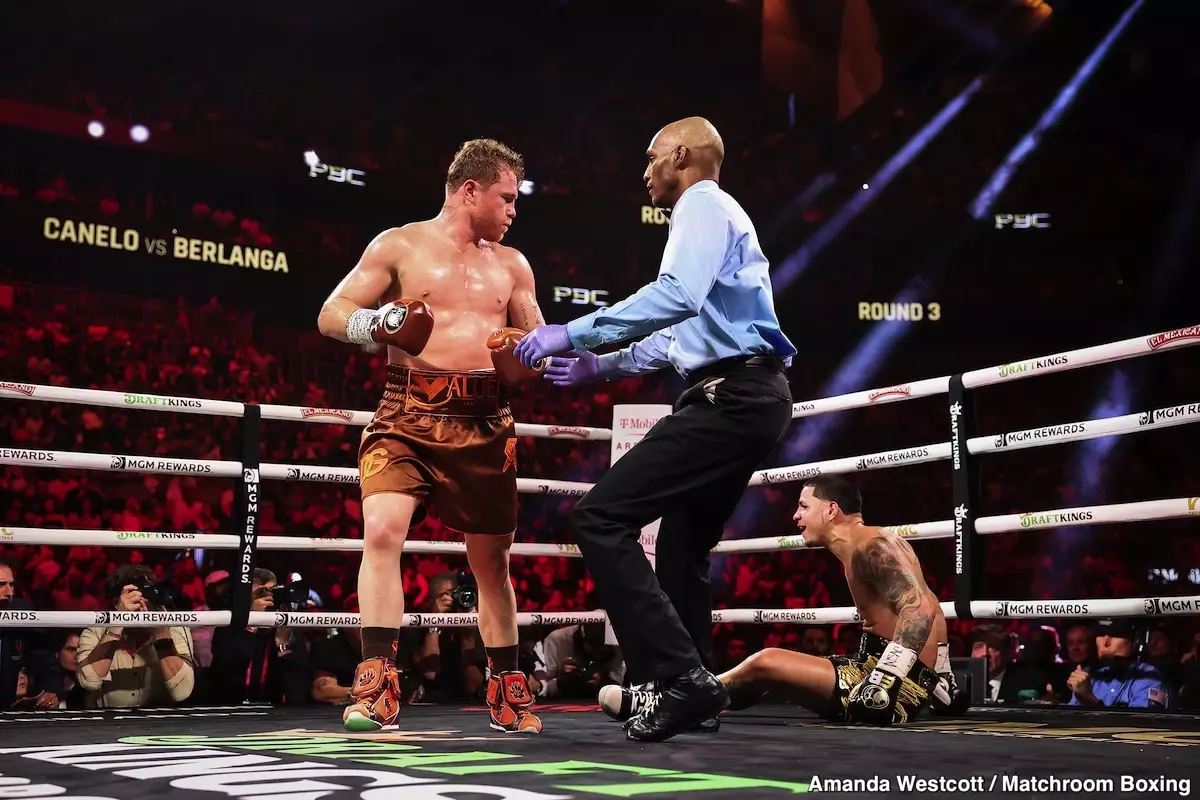Edgar Berlanga’s proclamations about taking over the super middleweight division reflect a typical but often misguided mindset among young fighters eager for rapid success. His ambition to surpass established contenders and even secure a rematch with Canelo Alvarez reveals a bold confidence that can border on naivety. Yet, beneath this bravado lies a stark reality: the path to the top is paved with more than just words and bravura performances. It requires consistency, strategic planning, and most importantly, a recognition of the brutal competitiveness of professional boxing.
Berlanga’s eagerness to reface Canelo seems more like a statement of personal pride than a realistic goal rooted in boxing’s current landscape. His isolated victories against lower-tier opponents have failed to build a resume that commands respect in the division. It’s tempting to admire his fire and ambition, but an honest analysis shows that his current standing is far from being the leader of any division, let alone the entire super middleweight class. His claims of dominance are, at this stage, more bravado than fact, an attempt to position himself as a future titan rather than a current threat.
The Reality Check: How the Industry Shapes Opportunities
One cannot ignore how much influence promoters and sporting organizations exert over a fighter’s career trajectory. Berlanga’s comments about wanting a rematch with Canelo, despite the slim odds of it happening soon, highlight a common misconception: fighters often believe their talent alone should open doors. In reality, opportunities are heavily dictated by promotional politics, network decisions, and the strategic interests of the sport’s power players.
Turki Alalshikh’s unpredictable decision-making, coupled with the labyrinthine matchmaking system, makes it increasingly unlikely that Babelranga will receive the fights he craves in the near future. The fights we see promoted are often dictated by contract negotiations and marketability, not merit or skill alone. Berlanga’s heroics on social media and in interviews serve more as marketing tools than strategic steps toward division dominance. His attempts to leapfrog recognized contenders display a misunderstanding of the sport’s internal dynamics.
Assessing the Competency Gap: Talent Versus Reality
Berlanga’s ring record and recent performances offer ample evidence that he is far from the dominant force he aspires to be. His knockout victory over a low-level opponent after Canelo’s defeat was more about promotional storytelling than boxing prowess. His critiques of opponents—claiming to be far above them and dismissing their abilities—reveal a false sense of superiority that isn’t backed by consistent, high-level competition. Conversely, his losses and struggles against journeymen like Marcelo Coceres expose vulnerabilities that could be exploited by more skilled or disciplined fighters.
The reality is clear: Berlanga’s resume is underwhelming for someone claiming to want to “take over” a division. His win-loss record doesn’t support a narrative of unstoppable dominance, nor does his actual performance show an evolved skill set capable of beating the best in the division. If he neglects this truth, he risks fighting uphill battles with diminishing credibility.
Concluding Reflection: The Hard Path to Respect
In boxing, aspirations alone do not shape history; validated skill, strategic patience, and relentless perseverance do. Berlanga’s declarations might invigorate his fans, but the informed observer recognizes they reflect a fighter still navigating the early stages of his career, not a champion-in-waiting. For him to genuinely “take over,” he needs to recalibrate his attitude, develop a more rounded skill set, and accept that the road to division supremacy is long, winding, and fraught with setbacks.
His current trajectory, full of bravado and ambitious claims, risks making him a target for critics who see through the hype. If Berlanga truly desires greatness, he must shift from chasing headlines to focusing on consistent improvement and understanding that meaningful opportunities are earned through sustained effort—not through bold declarations or wishful thinking. The sport’s history teaches us that the biggest stars are often those who quietly work behind the scenes, accept their shortcomings, and grow stronger with every fight. Until then, Berlanga’s dream remains, at best, an optimistic hope that may take years—and more fights—to realize.

